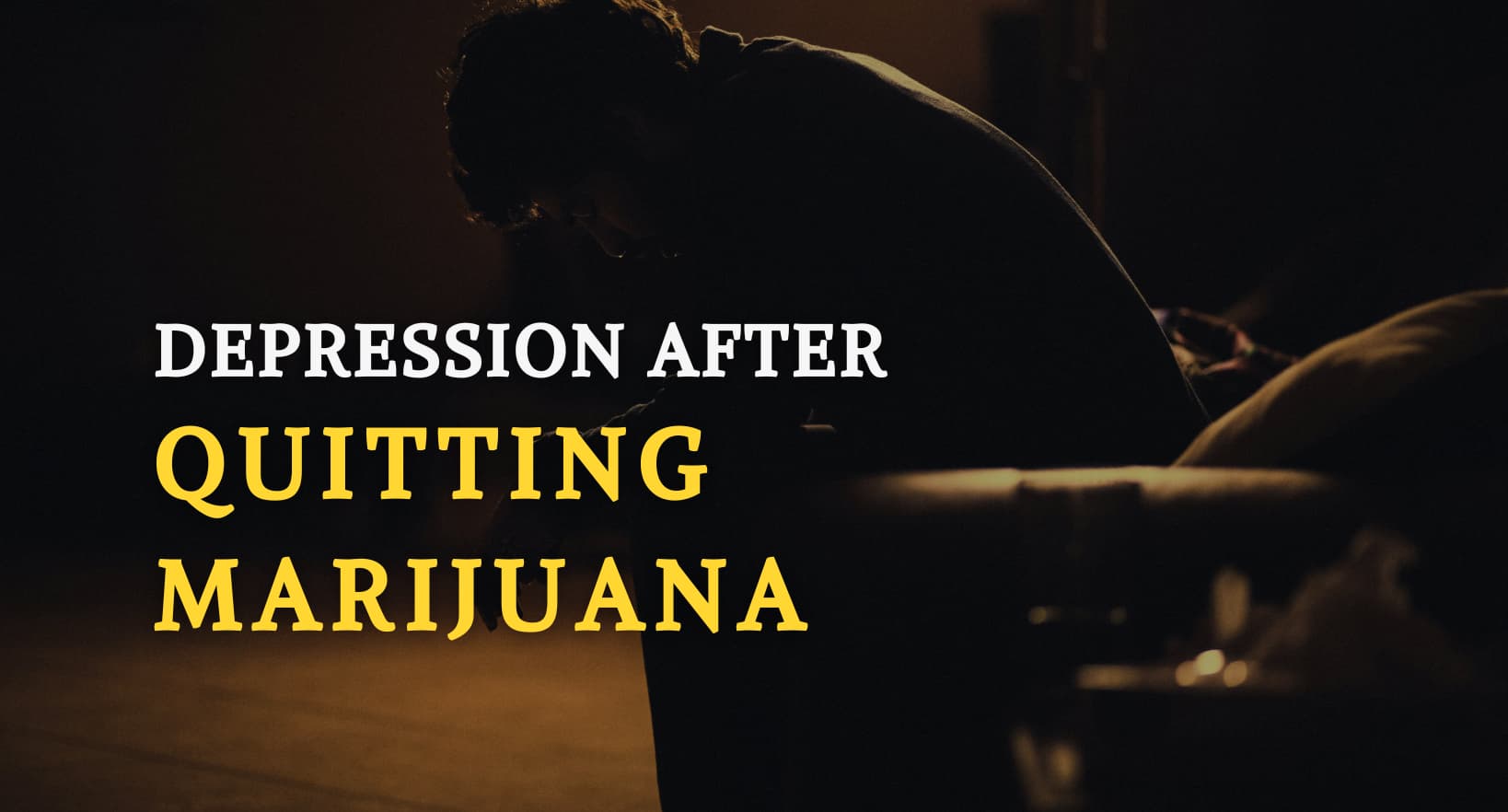
Depression After Quitting Cannabis: A Guide to Finding Your Balance Again
Quitting marijuana can lead to immediate changes in your mood and mental state. Many individuals report experiencing symptoms of depression after they stop using cannabis. This reaction is partly due to the way marijuana interacts with the brain’s endocannabinoid system, which plays a role in mood regulation. When regular marijuana use is suddenly stopped, the brain needs time to adjust to the absence of cannabinoids, leading to withdrawal symptoms that can impact mental health.
Understanding the Link Between Quitting Marijuana and Depression
Neurotransmitter Changes
Stopping marijuana use can disrupt the balance of neurotransmitters in the brain, such as dopamine and serotonin, which are directly linked to mood and happiness. This imbalance can lead to feelings of depression, a common symptom of withdrawal from smoking weed.
Psychological Dependence
For some individuals, smoking marijuana serves as a coping mechanism for stress, anxiety, or underlying mental health disorders. When it’s no longer an option, those underlying issues can surface more intensely, manifesting as depression, further complicating the marijuana withdrawal timeline.
Withdrawal Symptoms
The physical and psychological symptoms of marijuana withdrawal, including anxiety, irritability, and trouble sleeping, can compound feelings of depression during the initial quitting phase, especially for those quitting weed cold turkey.
What Are The Signs of Depression From Marijuana Withdrawal?
Recognizing the signs of cannabis withdrawal depression is crucial for seeking appropriate help and support. Symptoms may include, but are not limited to:
- – Persistent sadness or low mood
- – Loss of interest in activities once enjoyed
- – Changes in appetite or weight
- – Sleep disturbances (insomnia or sleeping too much)
- – Fatigue or lack of energy
- – Feelings of worthlessness or excessive guilt
- – Difficulty concentrating or making decisions
- – Thoughts of death or suicide
If you or someone you know is experiencing these symptoms, especially thoughts of harm or suicide, it’s essential to seek professional help immediately.
Short-Term Strategies for Managing Withdrawal-Induced Depression
Successfully navigating the initial weeks after quitting marijuana is crucial for mitigating the impact of withdrawal-induced depression. Here are some strategies to help manage these challenging times:
- Establish a Healthy Routine: Regularity in your daily activities can bring a sense of normalcy and control, an essential strategy for those experiencing cannabis withdrawal.
- Engage in Physical Activity: Exercise can significantly improve mood and reduce symptoms of depression by releasing endorphins, the body’s natural mood elevators, making it a vital strategy for those experiencing weed withdrawal symptoms.
- Ensure Nutritional Intake: Eating healthy foods and focusing on a balanced diet of fruits, vegetables, lean proteins, and whole grains can positively impact your mood and energy levels.
The Role of Professional Help in Addressing Depression
Seeking professional help is a critical step in managing depression, especially when it’s related to substance withdrawal.
Mental Health Professionals
A therapist or counsellor can provide valuable support and coping strategies for dealing with depression from weed withdrawal. Cognitive-behavioral therapy (CBT) is particularly effective in addressing negative thought patterns.
Addiction Specialists
For those experiencing withdrawal symptoms, addiction treatment specialists can offer guidance and resources tailored to substance use recovery.
Medical Evaluation
In some cases, a healthcare provider may recommend medication to help manage depression symptoms. This should always be done under professional supervision.
Personalized Care: Tailoring Your Recovery Plan
Every individual’s journey to recovery is unique, influenced by factors such as the duration and intensity of marijuana use, personal health history, and co-occurring mental health conditions.
Comprehensive Assessment: Upon entering a treatment program, a thorough assessment will help tailor the recovery plan to your needs.
Holistic Approach: Effective treatment plans often include a combination of therapy, lifestyle changes, and sometimes medication, addressing both the physical and psychological aspects of withdrawal and recovery.
Support Systems: Incorporating support from family, friends, and peer groups can significantly enhance the recovery process, providing emotional support and motivation.
Managing depression after quitting marijuana involves:
- – Understanding the connection between cessation and mood changes.
- – Recognizing the symptoms of depression.
- – Taking proactive steps to mitigate its effects.
Establishing a supportive network and seeking professional help is pivotal in navigating this challenging phase toward long-term recovery.
Building a Support System
Creating a strong support system is an integral part of the recovery journey, particularly when dealing with the emotional and psychological challenges of quitting marijuana. Here’s how to build and utilize this system effectively:
Lean on Family and Friends: Share your experiences and challenges with trusted family members and friends. Their understanding and encouragement can be a powerful source of strength.
Connect with Peer Support Groups: Joining groups like Marijuana Anonymous can offer insights and camaraderie from those who are going through or have gone through similar experiences. Peer support can validate your feelings and provide practical advice on navigating recovery.
Engage in Community Resources: Look for community centers or online forums that offer support for those struggling with marijuana withdrawal and depression. Being part of a community can reduce feelings of isolation.
Long-Term Strategies for Mental Health and Wellness
Maintaining mental health and wellness requires ongoing effort. Here are long-term strategies that can help:
Continued Therapy: Regular sessions with a mental health professional can provide continuous support and strategies for managing stress and triggers.
Lifestyle Adjustments: Incorporating stress-reducing practices such as meditation, yoga, or mindfulness can profoundly benefit your mental health.
Healthy Habits: Committing to a healthy lifestyle, including proper nutrition, regular exercise, and adequate sleep, supports overall well-being and resilience against depression.
Encouragement and Resources
Embarking on the journey to overcome marijuana addiction and its accompanying challenges, including depression and withdrawal symptoms, demands patience, commitment, and a supportive network. As you navigate this path, keep these guiding principles in mind:
Progress, Not Perfection
Every step forward, no matter its size, is a victory. The journey to recovery is measured in progress over time, not in achieving an unrealistic standard of perfection. Whether it’s reducing marijuana use, managing withdrawal symptoms, or working through psychological symptoms, each achievement is significant.
Seek and Accept Help
The strength to acknowledge when you need assistance is a virtue. Professional help, be it through addiction treatment or mental health disorders counselling, is crucial. Don’t shy away from reaching out to addiction specialists or mental health professionals who understand the complexities of quitting weed cold turkey or the marijuana withdrawal timeline.
Utilize Available Resources
A wealth of resources is at your disposal for those grappling with cannabis withdrawal symptoms or navigating the withdrawal process from smoking weed. From websites offering guidance on quitting weed to helplines and local health services providing support for marijuana withdrawal and reduced cannabis withdrawal symptoms, assistance is readily available.
Battling Marijuana Withdrawal and Depression
Overcoming marijuana addiction and dealing with the aftermath, such as depression and physical symptoms of withdrawal, poses a formidable challenge. With the appropriate strategies, unwavering support, and accessible resources, recovery is a possible and reachable goal. Embrace this journey with an open heart and mind, buoyed by the knowledge that you are not alone. This is a deeply personal experience, yet it is enriched and supported by the collective understanding and empathy of a community attuned to the nuances of marijuana use disorder and committed to aiding those in need.
As you move forward, it’s important to remember the significant difference that professional treatment and a robust support system can make. Whether through inpatient treatment, counselling, or peer support groups, the resources available are designed to help you navigate the extended recovery period and manage the most symptoms effectively.
Sources
- – Trafalgar Residence “How to Quit Smoking Weed.”
– CMHA “Cannabis Legalization and Regulation.” (p. 9)
– CAMH “Cannabis.”
– CCSA “Clearing the Smoke on Cannabis.”





